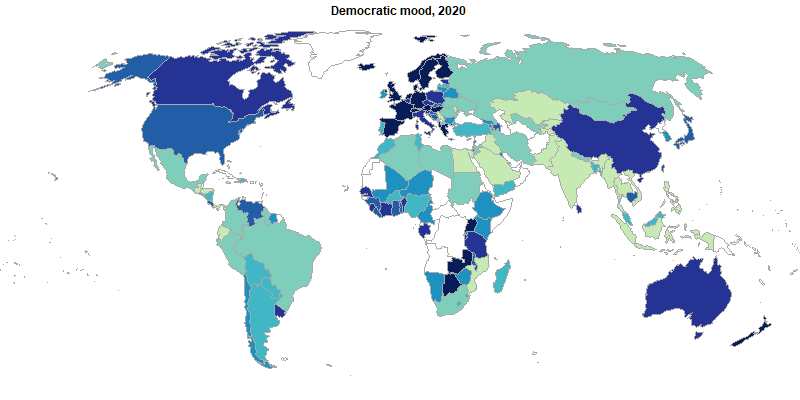Chris Claassen - data
Democratic Mood
Democratic mood measures the extent to which the public of a given country supports a democratic political system and opposes any autocratic alternatives. In contrast to satisfaction with democracy, democratic mood captures principled support for democracy. It is measured by applying a Bayesian latent variable model to aggregated survey data from a wide variety of cross-national survey projects. The latest update provides estimates for 141 countries, with estimates beginning in 1988 (for some cases) and ranging until 2020.
The Bayesian model is developed and described in this article. The mood estimates are extended and applied in several additional articles. This choropleth shows democratic mood in 2020.

This document provides more details on the survey items which were included in the measurement of mood, the coding scheme applied to aggregate the micro data, and the public opinion projects which fielded these surveys.
The democratic mood estimates are available in this dataset, provided in CSV format. The dataset includes the following variables:
- Country – country name
- Year – the year of observation
- SupDem – point estimates of democratic mood for each country and year
- SupDem_u95 – upper 95% credible bound of democratic mood
- SupDem_l95 – lower 95% credible bound of democratic mood
- SupDem_sd – standard deviation of democratic mood
- ISO3c – 3-digit ISO code identifier for each country
Democratic Satisfaction
Democratic satisfaction measures the extent to which the public of a given country is satisfied with the “way democracy works” in their country. Some scholars treat satisfaction as akin to democratic support; others use it as a summary measure of political support; yet others regard it as capturing an instrumental or performance-based appraisal of the regime. Whatever the interpretation, democratic satisfaction is widely used in cross-national opinion research.
It is measured by applying a Bayesian latent variable model to aggregated survey data from a wide variety of cross-national survey projects, covering 132 countries from as early as 1973 until 2020.
The Bayesian model is the same as that used to measure democratic mood. Earlier satisfaction estimates are used in this article. This choropleth shows democratic satisfaction in 2020.

This supplementary materials document provides details on which cross-national survey projects provided measures of democratic satisfaction (a similar but not identical item is used across different projects), as well as the coding scheme applied to aggregate the micro data.
The democratic satisfaction estimates are available in this dataset, provided in CSV format. The estimates range from 1973 (in a few cases) to 2020 (for all 132 cases). The dataset includes the following variables:
- Country – country name
- Year – the year of observation
- Satis – point estimates of democratic satisfaction for each country and year
- Satis_u95 – upper 95% credible bound of democratic satisfaction
- Satis_l95 – lower 95% credible bound of democratic satisfaction
- Satis_sd – standard deviation of democratic satisfaction
- First_yr – first year in which survey measures were available for that country
- ISO_code – 3-digit ISO code identifier for each country